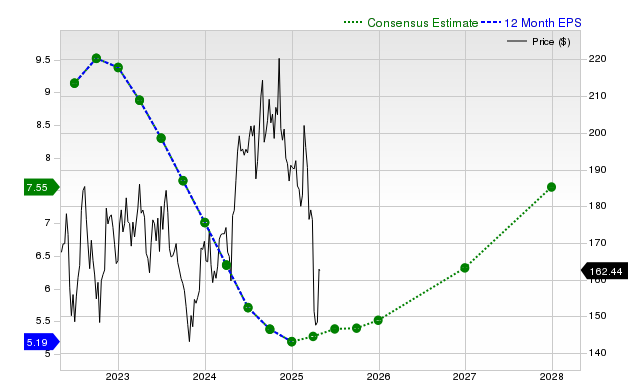Texas Instruments
(TXN) has recently been on Zacks.com’s list of the most searched stocks. Therefore, you might want to consider some of the key factors that could influence the stock’s performance in the near future.
Shares of this chipmaker have returned +1.4% over the past month versus the Zacks S&P 500 composite’s +1.1% change. The Zacks Semiconductor – General industry, to which Texas Instruments belongs, has gained 3.5% over this period. Now the key question is: Where could the stock be headed in the near term?
Although media reports or rumors about a significant change in a company’s business prospects usually cause its stock to trend and lead to an immediate price change, there are always certain fundamental factors that ultimately drive the buy-and-hold decision.
Earnings Estimate Revisions
Here at Zacks, we prioritize appraising the change in the projection of a company’s future earnings over anything else. That’s because we believe the present value of its future stream of earnings is what determines the fair value for its stock.
We essentially look at how sell-side analysts covering the stock are revising their earnings estimates to reflect the impact of the latest business trends. And if earnings estimates go up for a company, the fair value for its stock goes up. A higher fair value than the current market price drives investors’ interest in buying the stock, leading to its price moving higher. This is why empirical research shows a strong correlation between trends in earnings estimate revisions and near-term stock price movements.
Texas Instruments is expected to post earnings of $1.97 per share for the current quarter, representing a year-over-year change of -13.2%. Over the last 30 days, the Zacks Consensus Estimate remained unchanged.
For the current fiscal year, the consensus earnings estimate of $9.25 points to a change of +12% from the prior year. Over the last 30 days, this estimate has changed -0.3%.
For the next fiscal year, the consensus earnings estimate of $8.02 indicates a change of -13.3% from what Texas Instruments is expected to report a year ago. Over the past month, the estimate has remained unchanged.
Having a strong
externally audited track record
, our proprietary stock rating tool, the Zacks Rank, offers a more conclusive picture of a stock’s price direction in the near term, since it effectively harnesses the power of earnings estimate revisions. Due to the size of the recent change in the consensus estimate, along with three other
factors related to earnings estimates
, Texas Instruments is rated Zacks Rank #3 (Hold).
The chart below shows the evolution of the company’s forward 12-month consensus EPS estimate:
12 Month EPS

Projected Revenue Growth
Even though a company’s earnings growth is arguably the best indicator of its financial health, nothing much happens if it cannot raise its revenues. It’s almost impossible for a company to grow its earnings without growing its revenue for long periods. Therefore, knowing a company’s potential revenue growth is crucial.
For Texas Instruments, the consensus sales estimate for the current quarter of $4.61 billion indicates a year-over-year change of -4.5%. For the current and next fiscal years, $19.97 billion and $18.39 billion estimates indicate +8.8% and -7.9% changes, respectively.
Last Reported Results and Surprise History
Texas Instruments reported revenues of $5.24 billion in the last reported quarter, representing a year-over-year change of +12.9%. EPS of $2.45 for the same period compares with $2.07 a year ago.
Compared to the Zacks Consensus Estimate of $5.1 billion, the reported revenues represent a surprise of +2.72%. The EPS surprise was +3.38%.
The company beat consensus EPS estimates in each of the trailing four quarters. The company topped consensus revenue estimates each time over this period.
Valuation
No investment decision can be efficient without considering a stock’s valuation. Whether a stock’s current price rightly reflects the intrinsic value of the underlying business and the company’s growth prospects is an essential determinant of its future price performance.
While comparing the current values of a company’s valuation multiples, such as price-to-earnings (P/E), price-to-sales (P/S) and price-to-cash flow (P/CF), with its own historical values helps determine whether its stock is fairly valued, overvalued, or undervalued, comparing the company relative to its peers on these parameters gives a good sense of the reasonability of the stock’s price.
The Zacks Value Style Score (part of the Zacks Style Scores system), which pays close attention to both traditional and unconventional valuation metrics to grade stocks from A to F (an An is better than a B; a B is better than a C; and so on), is pretty helpful in identifying whether a stock is overvalued, rightly valued, or temporarily undervalued.
Texas Instruments is graded C on this front, indicating that it is trading at par with its peers.
Click here
to see the values of some of the valuation metrics that have driven this grade.
Conclusion
The facts discussed here and much other information on Zacks.com might help determine whether or not it’s worthwhile paying attention to the market buzz about Texas Instruments. However, its Zacks Rank #3 does suggest that it may perform in line with the broader market in the near term.
7 Best Stocks for the Next 30 Days
Just released: Experts distill 7 elite stocks from the current list of 220 Zacks Rank #1 Strong Buys. They deem these tickers “Most Likely for Early Price Pops.”
Since 1988, the full list has beaten the market more than 2X over with an average gain of +24.8% per year. So be sure to give these hand-picked 7 your immediate attention.
Want the latest recommendations from Zacks Investment Research? Today, you can download 7 Best Stocks for the Next 30 Days.
Click to get this free report








